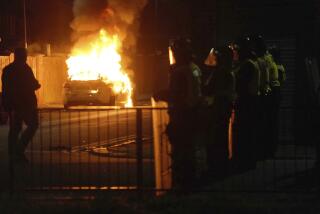Beating of a Russian Lawmaker Puts Spotlight on Police Brutality
- Share via
MOSCOW — Ivan Musatov wouldn’t have gotten involved normally. In this violent city, it wasn’t that unusual to see two men beating up another young man on a sidewalk. It was the way they were doing it. Photographing it with a cellphone. First one would knock the youth’s slumping head with a fist under his chin, then the other would snap a picture.
Musatov, a deputy in the Russian parliament, didn’t need to be in the middle of someone else’s trouble. But when they started dragging the weakened man into the bushes, Musatov jumped out of his car. The two men turned on Musatov, and when the lawmaker’s friend also rushed in, a dozen or more men sprang out of a nearby cafe and began beating both of them. Musatov got to his cellphone and called his wife. “Come to the Paveletsky train station,” he pleaded. “They’re killing me.”
Three nearby shopkeepers shouted that they were calling the police. “We are the police,” one of the attackers said curtly.
By the time it was over, Musatov had three broken ribs, a concussion and a black eye. His friend was covered in blood, with damage to his stomach and liver. And three of the officers, all off-duty at the time, were under investigation for hooliganism and abuse of office.
“Russian people are much more scared of the police than they are of the mafia, because the police are more dangerous,” said Musatov’s wife, Anastasia Mikhailovskaya, sharing lunch with her husband at a downtown restaurant last week as he was discharged from one hospital and preparing to check into another.
Of all the hazards that menace a Russian as he leaves his house each day -- drunk drivers, Chechen terrorists -- none as a rule inspires more dread than the street-corner cop who halts someone going into the subway and directs him into the feared militsia office in the corner.
In a poll conducted by the respected Levada Center, 38% of respondents ranked terrorists and drug dealers as the second and third most criminal professions in Russia, behind the police. A separate poll in March showed that 56% of Moscow residents feared the police.
At his annual state of the nation address in April, President Vladimir V. Putin acknowledged that reforming the police had become a national priority. “We need law-enforcement authorities that a law-abiding citizen can be proud of, rather than crossing over to the other side of the street at the sight of a uniformed man,” he said.
Defense lawyers have filed cases on behalf of clients who leapt to their deaths from the fifth-floor windows of detention centers rather than face torture during interrogations. Human rights advocates chart the disappearance and death of citizens who have had contact with the police, and most Russians consider an encounter with the police a success if it concludes with the payment of a small bribe.
Police violence and intimidation have reached such a level that they have become a focal point for Putin’s opposition, which argues that the country has returned to a police state under the leadership of the former KGB officer.
“When people do something which violates human rights, it’s one thing. But when they have the authority of the government to do this, that is police terror, because one of their aims is to terrorize civil society, to make them keep silent and abide by all the rules,” said Roman Dobrokhotov, spokesman for the pro-democracy youth opposition group Us.
“Some people are afraid that we are sliding back to the Soviet Union, but in fact, people see more and more that this strong arm cannot solve their real problems,” Dobrokhotov said. “We see the rising of social protest, and the more it is suppressed, the stronger it becomes.”
Musatov, a 29-year-old deputy with the Liberal Democratic Party, is nominally in the political opposition but comes from a strongly nationalist party that generally supports an authoritarian bent in government. Yet the lawmaker announced that as a result of the Aug. 26 attack, he was organizing a telephone hotline for citizens to call with complaints about the police.
He said he believed the officers who attacked him, whom he believes to have been a drunken mix of new recruits and experienced officers celebrating a recent police academy graduation, would have killed the youth, and possibly him, if bystanders had not called police from other stations to the scene.
Even then after a large number of uniformed police arrived, Musatov said, he was left lying handcuffed on the sidewalk and was repeatedly kicked in the ribs and had his head banged against the pavement by officers who claimed his parliament credential was a forgery.
“One of the officers who was in plainclothes threatened to rape me. He said, ‘We will take you to the police station and we will [assault] you there.’ He was holding up his private parts like Michael Jackson in a dance.”
He said a senior police lieutenant listened to his protests and filed a report that led to the criminal investigation by the Moscow prosecutor’s office. Prosecutor spokesman Sergei Marchenko said two officers were in custody and a third was hospitalized with an eye injury. There has been no other official reaction, and no apology; senior Interior Ministry leaders have been silent on the case.
“It is not a police force which acts like this. They provide no safety, no security. But it may be that I am the stone they stumbled on,” Musatov said. “It is time to act. And if we need to cure the state of its sickness, we need to start at the head.”
More to Read
Sign up for Essential California
The most important California stories and recommendations in your inbox every morning.
You may occasionally receive promotional content from the Los Angeles Times.













